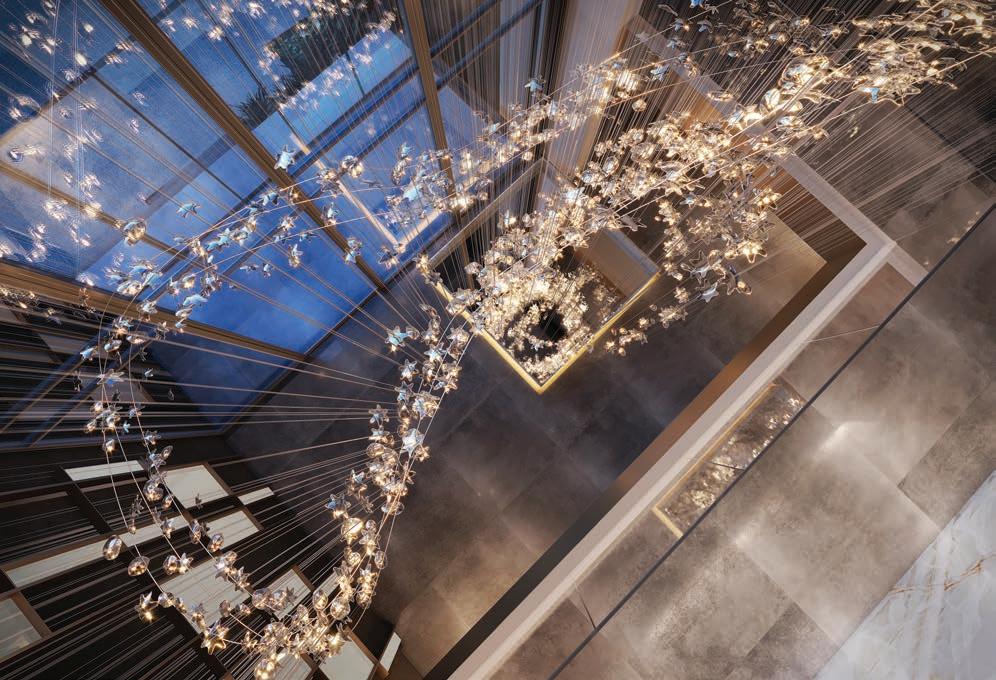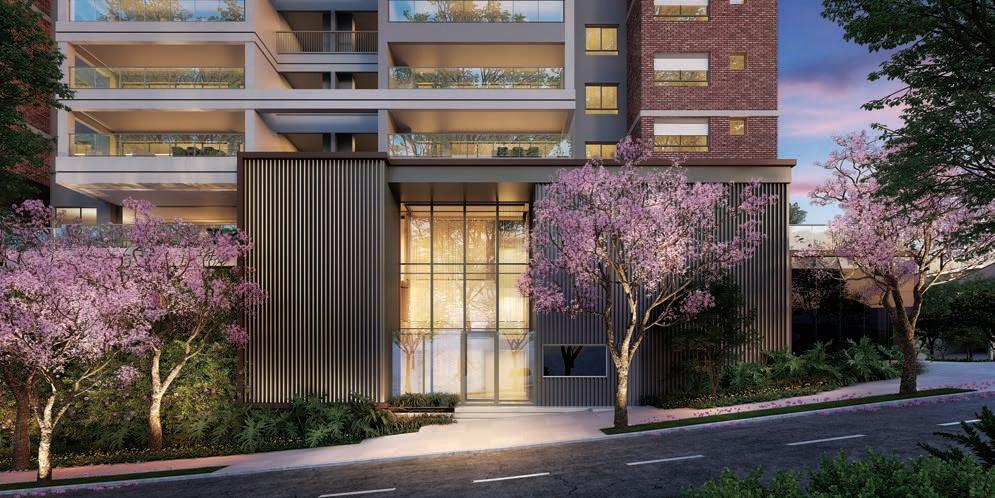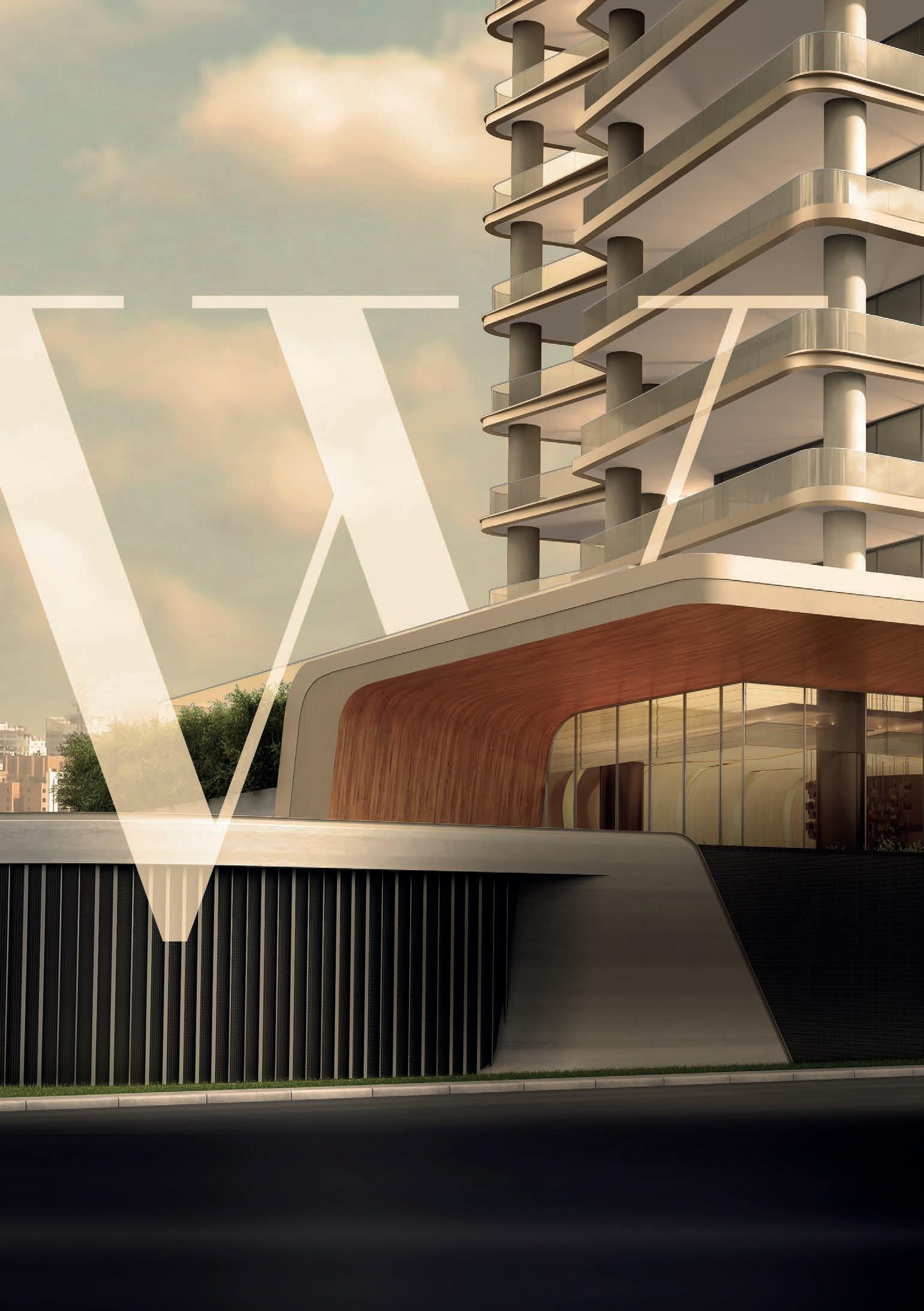
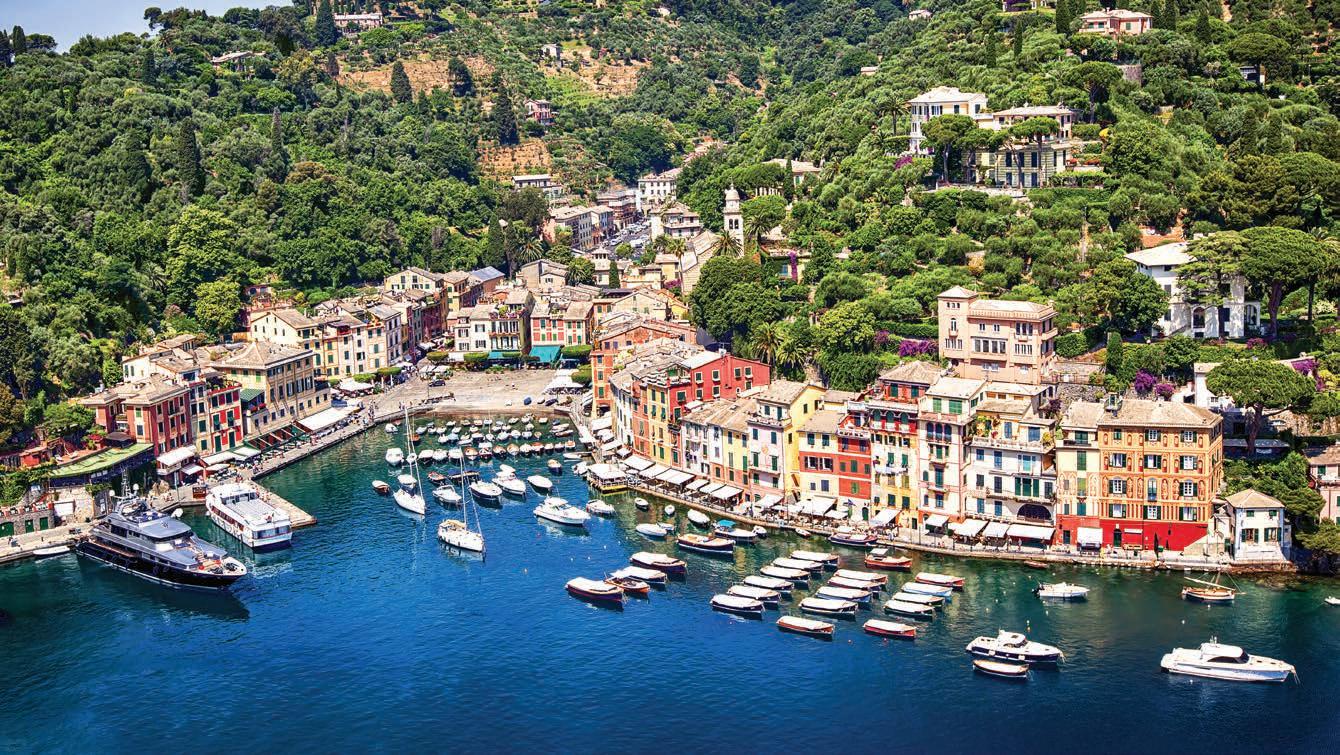









We’ve come to the number two edition of WHAT’S NEXT and once again we introduce content that reflects Cyrela’s DNA: excellence in everything the company does, with the best architecture and design in its luxurious projects. A solid company that constantly delves into innovation and closely monitors the trends in behavior and lifestyle of its audience.
Readers will find on the following pages an excerpt of what happens in terms of contemporary in the beginning of the third decade of the 21st century. The best places in the world, new experiences and shifts in today’s behavior and style. Content specially prepared for you. On the final pages, in the Lifestyle section, you’ll find Cyrela’s most recent projects.
Enjoy your reading.
cyrela.com.br Av. Brg. Faria Lima, 3600 CEP 04538-132 (11) 4502-3000 São Paulo - SP
MARKETING Danielle Molinari Maíra Maregatti
EDITORIAL DESIGN
www.studiolemon.com.br Rua Capitão Antorio Rosa, 409 CEP 01443-010 Tel (11) 2888 - 2283 São Paulo - SP
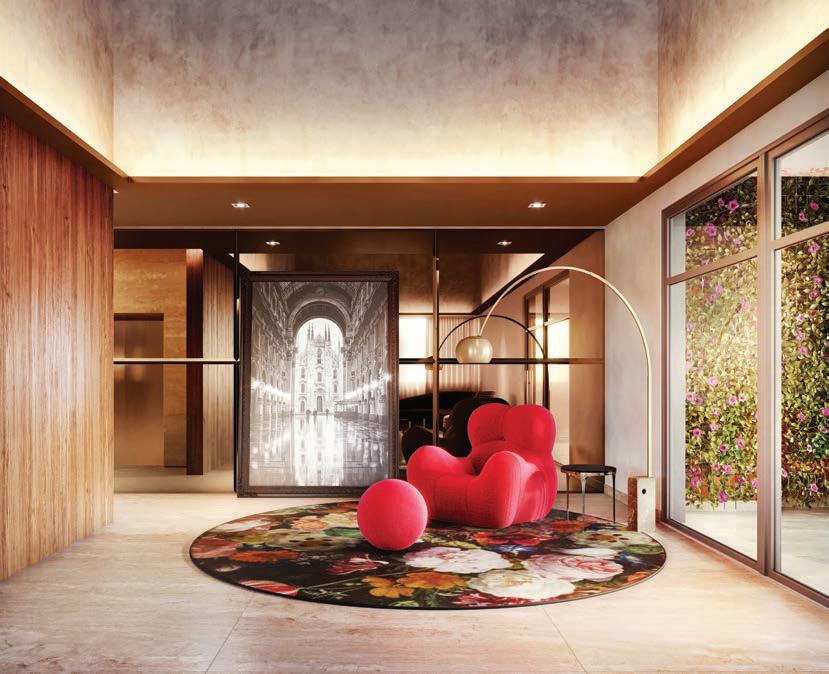
CREATIVE DIRECTOR Cesar Rodrigues cesar@studiolemon.com.br
MANAGING DIRECTOR Chico Volponi cvolponi@studiolemon.com.br
Lemon Comunicação & Conteúdo
DESIGN
Cesar Rodrigues
EDITOR Luiz Claudio Rodrigues luizclaudio@studiolemon.com.br

Lauro Lins Claudio Gues
Claudio Eduardo Nogueira Ramos
TRANSLATION
Gotcha! Idiomas





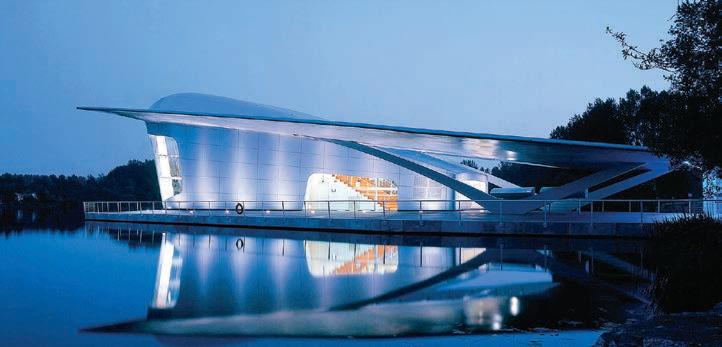

When fitness giant Equinox decided to enter the luxury hotel segment, it chose Manhattan’s Hudson Yards—NY’s new Rockefeller Center—with Rockwell Group interiors and affluent neighbors such as Coach, L’Oréal, and New York’s most hyped lookout point today: The Vessel. Upon entering the hotel, one can feel the urban setting and the inclination toward physical fitness, with the largest Equinox club ever built (over 18,000 sqm), a cryotherapy room, spa and an infinity reflecting pool on the terrace. Its rooms have smart layouts, padded walls and soft carpets. The hotel is part of the Grand Luxury Group chain, specializing in exceptional travel experiences and prime services, with attention to detail and the magic that makes it unique.




Four hotels worldwide for those who appreciate the good things in lifePHOTOS:


Jaffa was an ancient port city that was incorporated into Tel Aviv in 1950. And that’s where The Setai Tel Aviv Luxury Hotel is located. Installed in an old Ottoman prison, it has 120 rooms, a spa and an infinity pool overlooking the Mediterranean Sea and the Port of Jaffa. If possible, opt for the
Plus room, with a view to the
balcony to make the most of the glorious port. With all this history, The Setai is a unique hotel that offers sophistication and tranquility at the intersection of the modern and ancient city of Tel Aviv-Jaffa.



To the surprise of many, the traditional Delano Las Vegas offers haute cuisine signed by one of the most influential chefs today: Frenchman Alain Ducasse. Together with executive chef Bruno Riou, Ducasse runs the kitchen of the Rivea, the hotel’s restaurant. There, the cuisine is inspired by the French and Italian Rivieras, focused on simple and fresh flavors of the Mediterranean, prepared with the best seasonal ingredients from the American West Coast. The relaxed atmosphere—with interior design signed by Frenchmen Patrick Jouin and Sanjit Manku—is perfect for appreciating the colors, flavors and aromas of Southern France and Italy.
In Tel Aviv, The Jaffa is installed in a renovated 19th century Neo-Renaissance building. The hotel is the first venture of American tycoon Aby Rosen, co-founder of RFR Holding. Rosen is known as one of the world’s leading art collectors, with a collection worth an estimated $700 million. So, it was not by chance that the hotel’s facilities were chosen to be installed in an old U-shaped building located over the ruins, with an internal patio and two floors. The building style is inspired by the Roman Renaissance, a harmony of arches, columns and stone statues, stained glass, braided laurels and iron flowers. The hotel’s interior design was carried out in partnership with Israeli Ramy Gil and Englishman John Pawson. The result is a subtle complicity between the two centuries.

marriot.com/hotel/travel/ tlvlc-the-jaffa-a-luxury-collection-hotel-tel-aviv

With the signature of traditional brands, a car with curves and fluid lines and technologically advanced headphones combined with

modern classics for a perfect trip.

Louis Vuitton takes the spirit of travel into the world of sound with the house’s first wireless earbuds. These new portable companions remain faithful to the timeless values of the brand’s craftsmanship, to its travel spirit and to the extraordinary creativity. br.louisvuitton.com


With
that
In its first
the company created the
with
GT by
that
a
next
for

With large dimensions and a low back, the Jane armchair—by Poliform—is signed by designer Emmanuel Gallina. With these elements, the piece maximizes the subtleness of volumes, suggesting an immediate sensation of comfort. casualmoveis.com.br


The current décor invests in versatility, comfort and technology
By Dpot, the Satti armchair stands out for its curves and volumes. The combination of wood with different options of fabric or leather turns each choice into a unique piece. In addition, the anatomical shell shape embraces the body. The design is by Jader Almeida. dpot.com.br
A sofa whose functions you can adjust directly from your smartphone and save your favorite settings, in addition to the three predefined programs: relax, TV and read. By Natuzzi Editions, the sofa is called Trionfo and can be controlled using the exclusive App Sofa Control. In addition, the sofa can be controlled manually through a hidden panel of buttons located between the armrest and the seat cushion. natuzzi.com.br
Designer Piero Lissoni created the Dock upholstery system for B&B Italia. Flexible, this system allows eclectic compositions that extend horizontally, the cushions have sizes and dimensions that allow for double-sided use, corner seats and chaise longue arrangements, and armrests come in two depth sizes. With all this versatility, the sofa adapts and changes for those who like to get away from sameness. casualmoveis.com.br


Fueguia 1833 is a unique concept in the world of perfumery worldwide. The heart of the brand is in Patagonia, in its pristine territories, dominated by nature. In this environment, the brand finds native species that are cultivated and distilled. Since Julian Bedel created it in 2010, Fueguia 1833 fragrances are produced in limited editions, in crystal bottles that reveal the year and lot number—from 1 to 400—with a unique set of characteristics and peculiarities of the natural ingredients available at the time of each production. fueguia.com

Started in the 1980s by Alain Dominique Perrin, then President of Cartier, Fondation Cartier is a unique example of corporate philanthropy in France. Since it established in Paris in 1994, the foundation has been in an airy, light-filled building designed by architect Jean Nouvel. In this unique setting, exhibitions, conferences and art productions come to life. Its collection is estimated at almost 1,500 works acquired through donations from more than 350 artists from all over the world. fondationcartier.com


With an unwavering dedication to producing exceptional dishes, Alexandra Miller has been at the helm of EL&N since 2017, when the first branch opened its doors in the heart of Mayfair, on Park Lane. From field to plate, the concept of the Café follows the same premise as that of the bean to bar. In particular, coffee. Its journey begins on the farm with cultivation in exclusive terroirs to nourish the coffee cherries. Every lot of EL&N is hand-roasted to ensure a unique flavor. Everything so that visitors can enjoy a perfect espresso. elnlondon.co.uk

At the Four Seasons hotel, the Elena restaurant hosts gourmand events and it is an oasis amidst the bustle of Buenos Aires. On the menu, visitors find an extensive selection of meats appreciated by Argentines, from dry aged matured pieces to fresh seafood. The space is an added attraction for those who enjoy good design. With a dou ble height, the restaurant has 123 seats, a spiral staircase that leads to tables on the balcony level, black and white marble floors, arranged in a herringbone pattern, leather-clad tiles and metal light fixtures. m.fourseasons.com
With a private and isolated island in the Mauritius Islands, Le Touessrok has rooms and suites facing the turquoise waters of the Indian Ocean. Some have direct access to the beach, while the oth ers have a view to the sea from their balconies. The place is special because it is located on the pristine coast of Ilot Mangénie, with an exclusive beach for guests, extending for 3.5 km. Close to the edges of the hotel, I’lle aux Cerfs is home to one of the best golf courses in the world. grandluxuryhotels.com/hotel/shangri-la-le-touessrok-resort-spa

Born after 2010, the Alpha Generation is hyper-connected to the digital world and, given the volume and quality of information in the palm of their hands, they will be more demanding adults, careful in their choices and determined to make a difference
BY: CLAUDIO GUESDid you know that those born after 2010 are in the Alpha Generation?
Despite still being children, they have more digital literacy than their parents because of their intense interaction with mobile phones and computers from an early age. For them, technology is an extension of their way of perceiving the world. According to the American Pew Research Center, this new generation sees the world through a screen. Experts from the institute state that more than 2.5 million alphas are born every week in the world. And by 2025, when the other generation emerges, they will be more than 2.5 billion people.

Alphas are raised in families where household chores are shared, where fathers and mothers seek a balance between work and personal life like no other generation before. With this feedback, alphas are characterized by the behavior that exchanges the “me” for “us.” The idea of interacting, collaborating and sharing with others is a connection as important as being familiar with and skilled in the use of computers, apps and other electronic devices. According to the trendhunters, this generation will receive more care than previous generations, not only for the improvement in the quality of life in first-world western countries, but for the very close relationship with their parents,
seen as mentors, and teachers, who will be more willing to give guidance to a generation that has access to all sorts of information in the palm of their hands. But there is a downside pointed out by researchers in education and technology. Because of the long time spent on a monitor screen, alphas demonstrate oral communication problems.
Something that can already be seen today with people talking through apps, even when they are in the same space. They will
intensify group conversations via messaging apps. “Still developing, it is too early to affirm what they think, but the trend indicates that they are much more independent and will be very skillful in adapting to each new upgrade in the digital world,” says psychologist Vanessa Vieira Beraldo, specialist in Cognitive Behavioral Therapy.
The retail market has to be ready to embrace them, treating them
as human beings, not consumers. According to a mapping produced by Wunderman Thompson Commerce - a global e-commerce consulting firm - 66% of the Alphas will only buy products from companies trying to do good to the world; 63% of them would like to work somewhere that will help save the planet; another 59% in companies that will help save lives, and 51% will seek jobs where technology makes a difference.


 BY: LUIZ CLAUDIO RODRIGUES | PHOTOS: COURTESY OF ASYMPTOTE ARCHITECTS
BY: LUIZ CLAUDIO RODRIGUES | PHOTOS: COURTESY OF ASYMPTOTE ARCHITECTS
Created by Hani Rashid and Lise Anne Couture, Asymptote Architecture in New York stands out among other contemporary architecture studios for its amazingly shaped buildings, with projects that combine intelligence and innovation. More than creation, the architectural duo uses new digital technologies and tools to advance in solution engineering and environmental sustainability, in addition to the perspective of the projects integrating with the surroundings and urban planning of each city. Their best known projects include the Yas Viceroy Hotel, in Abu Dhabi; the ARC Multimedia Theater, in Daegu, South Korea; the HydraPier cultural pavilion in the Netherlands; and the Univers Theaters in Aarhus, Denmark, among others. Asymptote Architecture recently completed the building of the ING bank headquarters in Gent, Belgium; and Velo Towers in Busan, South Korea.
Its work philosophy is based on the search for challenging and engaging projects that are generally unprecedented, with a multiscale and multidisciplinary approach,” says the architectural duo who are proud to work in partnership and collaboration with their clients and have a team of talented professionals and specialists in different areas. “Asymptote Architecture believes that collaboration is a mechanism that drives extraordinary people,” say Rashid and Couture. Another pillar of the office’s creative process is the search for cuttingedge materials, techniques and

technologies and bold approaches to sustainability issues, which are taken into account from the beginning of the projects, in collaboration with specialized consultants. The vision of the future of the “Asymptotes” (as they call themselves) is to believe in the use of knowledge acquired empirically through experience
and observation, in addition to research and continuous professional development. “The combination of curiosity, critical thinking and creativity generates the kind of inspiring architecture and urbanism that brings new experiences and meaning to today’s life in a world of rapid change,” add the architects.
The flirting between fashion and design in the Salvatore Ferragamo-Molteni&C partnership
BY: LUIZ CLAUDIO RODRIGUES | PHOTOS: COURTESY OF FERRAGAMO | MOLTENI&CSince the 2010s, Salvatore Ferragamo has flirted with the universe of decor. Even without having a Home product line like some fashion designers, the Italian shoe brand often partners and carries out events with important Italian furniture manufacturers. This affinity is not by chance. Salvatore Ferragamo was fascinated by architecture and design, which inspired many of his creations. His legacy has creations considered as masterpieces of design, which are easily associated with the design of furniture, household objects and contemporary architecture.
To begin with, Cassina is his partner in developing his concept stores worldwide, designing the interiors according to specifications from Ferragamo’s design team. In 2014, during the Furniture Expo in Milan,

the brand, in association with Molteni&C, presented the installation ‘Affinità Elletive’, curated by designer Rodolfo Dordoni. The protagonists of the installation, at the Salvatore Ferragamo boutique, on Via Montenapoleone, in Milan, were pieces from the Gio Ponti collection, produced by Moltoni&C from original sketches kept in Gio Ponti’s archives, accompanied by reproductions of original documents from the famous Italian designer and sketches from the Salvatore Ferragamo Museum. In particular, the reissue of the D.153 armchair, with a satin brass structure and upholstered in leather or fabric. Another highlight is the D.655.2 dresser, with drawers hand-painted in white with wooden knobs, in various sizes, in elm, mahogany, rosewood and Italian walnut.
ferragamo.com | molteni.itIn 2018, both brands presented the Outside/Inside installation, with exclusive seat design from the Silkroad Collection, by designer Alan Chan. Store windows highlighted the Heritage Collection by Molteni&C, exploring the East/West dialog through significant works of modern and contemporary design, mixing cultures, crafts and cutting-edge technology. This year, the Teorema chest of drawers was presented in the form of a revolving sculpture, designed by Ron Gilad. All reissued or new pieces developed in the two partnerships between SF and Molteni&C are exclusive collections, with limited and numbered editions. Nothing has been disclosed so far for 2020, but let’s hope that this partnership between fashion and decor continues for many years.






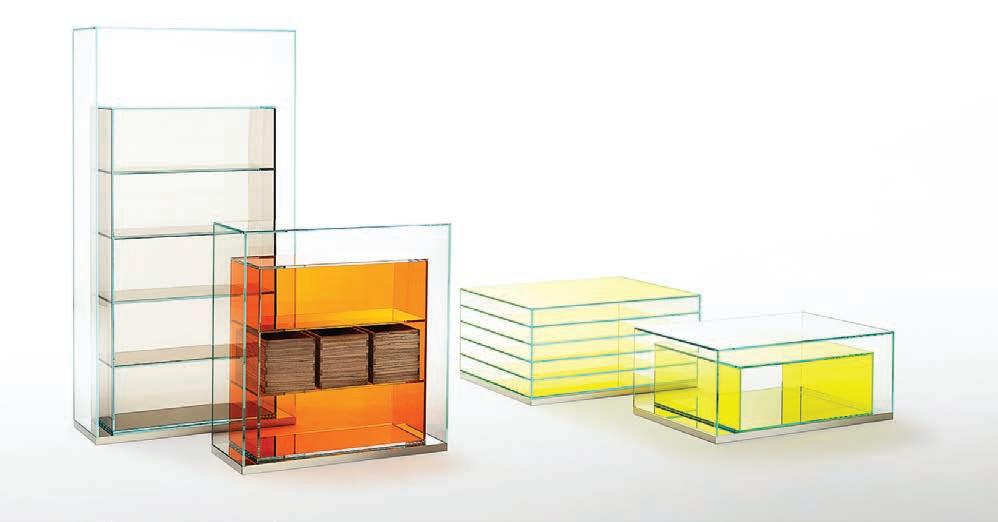 BY: LAURO LINS | PHOTOS: COURTESY OF ZANOTTA | GLAS ITALIA | ARTEMIDE | WONDER GLASS
BY: LAURO LINS | PHOTOS: COURTESY OF ZANOTTA | GLAS ITALIA | ARTEMIDE | WONDER GLASS

The combination between transparency and minimalism is nothing new. Since Mies van der Rohe designed the German Pavilion at the Barcelona International Fair in 1929, translucent glass has never gone out of style. Even going in and out of the architecture and design circuit, glass became more than just a material, it became a style. And in this new century, everyone wants to connect with the landscape: be it the city skyline or nature in the countryside.
And glass, more than any other material, makes that connection possible. Collections of leading international designer brands take advantage of its lightness to create contemporary furniture and light fixtures that are already conceived as new design icons. This is the case with recent launches by Italian brands Zanotta, Glas Italia, Artemide, and British WonderGlass.
Zanotta designed its collection based on the Urban Passion concept. In this collection, the connection between outdoor and indoor is established by the power of an open window of an apartment to urban settings, with interior solutions that reflect metropolitan identities. Among the lines of the brand, Echino— designed by Sebastian Herkner— is formed by end and coffee tables with three-layered blown glass legs in various colors and tops in steel plates with satin, natural or black nickel finish. Glas Italia took
The transparency of glass in different styles, from contemporary minimalist, to craft to new technologies
Glass became more than just a material, it became a style
advantage of color and, under the creative direction of designer Piero Lissoni, invited renowned designers such as Mario Bellini, Philippe Starck, Patricia Urquiola and Yabu Pushelberg. Among the highlights is the Box in Box line, created by Philippe Starck, which focuses on functionality and consists of a series of tables, boxes and open furniture designed as a box in a box. Combining color and transparency, the pieces are made of extra light glass with a polished stainless steel base.
Among the novelties by Artemide, the famous Italian manufacturer of luminaires, the Gople lamp is a mouth-blown glass, produced using the old traditional Venetian technique, but with the newest lighting technology that uses the circadian rhythm—which mimics the variation of the movement of the
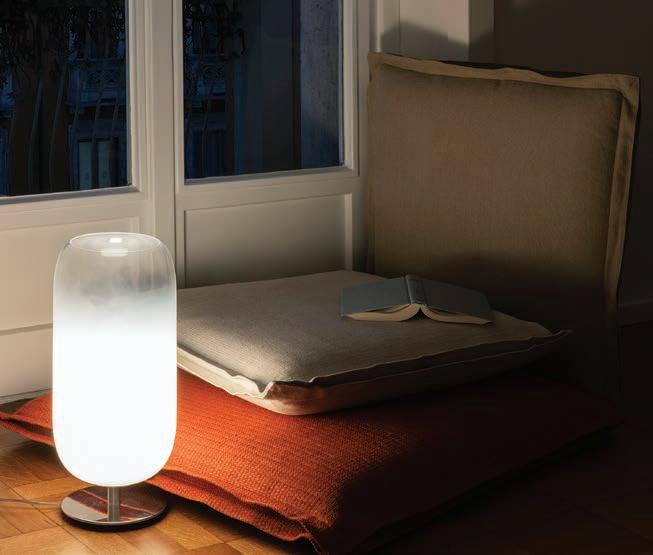
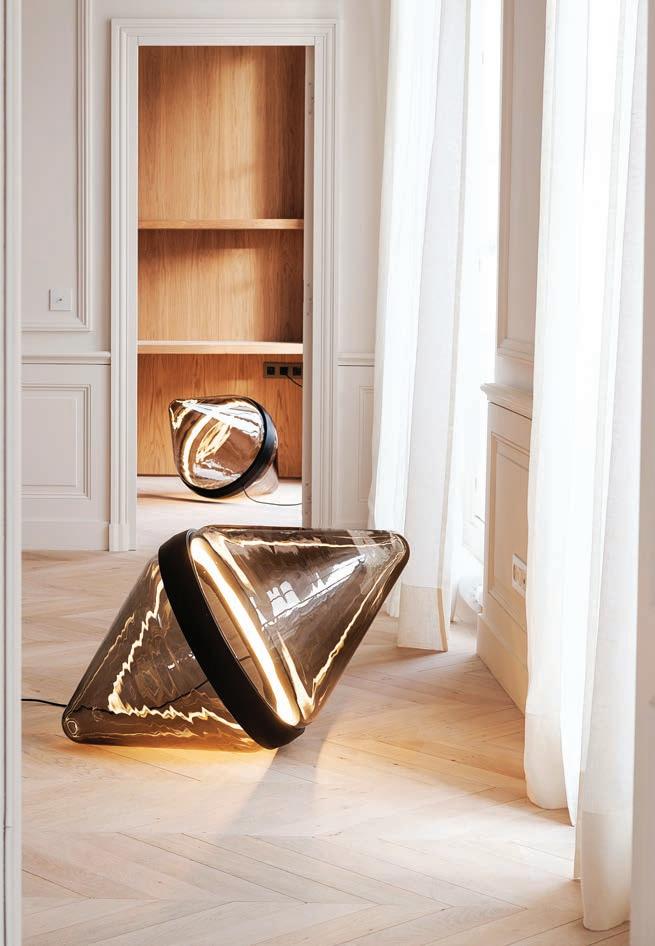

sun during the day—its system is the RWB (red-white-blue) for the psychophysical well-being of people reconnecting them with nature, without the traditional artificial light. In the same segment, WonderGlass combines traditional craftsmanship and contemporary design when creating its luminaires using subtle colors and visual elements in order to capture people’s imagination. Among its collections, the Hollow lamp— designed by Dan Yeffet—adopts a new concept of floor lamp, different from the conventional design. Purposely developed to be a glass sculpture, while illuminating other objects, it takes center stage in the space. Hollow is majestic, whether on or off. Glass, in its multiple variations, reaffirms that it is here to stay and evolve in the 21st century.
Cyrela’s sophistication joined the international design of Yoo Studio—founded by Philippe Starck and John Hitchcox—to create the apartment building Glass Art by Yoo. A project with a transparent soul, in the district of Perdizes. In it, natural light is reflected in spaces that open to the city landscape.

At the age of 75, Elie Horn—founder of Cyrela— currently dedicates his days to doing physical exercises in order to stay healthy, goes every day to the company’s headquarters, where he dedicates 70% of his time to philanthropy and 30% to business as Chairman of the Board of the real estate development company. In recent years, Horn has become an example of corporate philanthropy for having donated 60% of his personal fortune to charity. As a result, he is the only Brazilian entrepreneur affiliated with the organization ‘The Giving Pledge’, a famous club of philanthropist billionaires created by Bill Gates and Warren Buffett. In his company, he created the Cyrela Institute, focused on various social projects for the education of children and young adults. On a sunny evening Elie Horn gave an exclusive interview to the WHAT’S NEXT newspaper. Here is the full content of our conversation.

WHAT’S NEXT: In the 1950s, at the age of 11, Elie Horn arrived in Brazil from Syria. He started working at the age of 19, until 2014. In this life journey—as a person, not as a successful entrepreneur—what did you learn about the Brazilian people?
Elie Horn: A warm, smart, egalitarian people, without racism. They are very warm people, but something has changed in relation to ten, fifteen years ago. Violence didn’t exist back then. It’s something new. We lived a normal life. Thirty years ago buildings didn’t have any gates, it was safe, but not anymore. Something has changed, which is not typical of the Brazilian people.
WHAT’S NEXT: How do you see the future of Brazil?
Elie Horn: The future of Brazil follows the future of mankind. But my dream is that there will be no more violence, rape, murder, evil.
WHAT’S NEXT: You donated 60% of your personal fortune to philanthropy. We know that you learned this from your father and religious beliefs. You are known as a Jewish man of great faith. You do permanent work to engage Brazilian businessmen in philanthropic projects. Have you made any progress in convincing affluent Brazilians?
Elie Horn: Latin culture is more difficult than the Anglo-Saxon culture, which has donation as one of its principles. The United States gives 2% of its GDP to charity, Brazil gives 0.2%. I would
like the Brazilian people to donate a little more in life, because when you have poor people, the rich should help; when you have the ill, doctors have to help; when you have extra money, you have to help. We live in a country that has many problems. For every action, there’s an equal reaction, so donating should not be optional. In my opinion, donating is not optional, it is mandatory.
WHAT’S NEXT: How do you evaluate this resistance? Is it cultural?
Elie Horn: There is no awareness among those who can donate. If people are aware of a problem, they can solve it, but when they are unaware, they can’t because they don’t know what it is. In my opinion, the rich do not give more money because they do not know the content of goodness. When I talk to people, they have no idea, but they end up convinced. I’ll give you an example: a few days ago a businessman who I only knew by name came to me. After one hour of conversation, he promised to donate 10% to charity every year. To whom? To which charity? He decided to open a family foundation and will donate 10% of his money to that foundation, which he will manage together with his children. Why do I do it my way? Because in this way there is no suspicion. If I ask for money for my cause, people might think ‘this guy is up to something’, when I ask for money for his cause, I don’t get the money, because my money is for the good, it
works. Sometimes I get 1%, 2%, sometimes 10%. In Brazil this is not controlled. People don’t do it because I am asking, they donate because they are convinced. So, sometimes I get a little more, sometimes a little less. I want to do much more, but I can’t. I try. Every time I come across someone I give it a try.
WHAT’S NEXT: Are your persistent?
Elie Horn: That’s one of my main qualities.
WHAT’S NEXT: You currently chair CYRELA’s Board of Directors and work from 7am to 9pm. Can you briefly describe your daily routine?
Elie Horn: That’s not true. I work out every day until 7:30am, for about three hours, but I come to the company every day. Until I was 68 years old, I worked from 6am to 9pm, six days a week. Due to Parkinson’s disease, I exercise for three hours, do philanthropy work for seven hours and work for three. I get up at 4:30am to exercise, then I come to the company and return home at 8:30pm. When the pain doesn’t bother very much, I stay a little longer.

WHAT’S NEXT: Architecture and Design are fundamental elements for Cyrela’s high-end products. When you were in charge of the company, did you invite architects of your generation to develop projects for the company? Or did the real estate market at that time have no appeal for designer works?
Elie Horn: I’ve always worked with architects. I’ve always valued design, aesthetics, façades. I no longer do that in the company.
In my opinion, architects can’t go totally unchecked. When they have too much freedom, they tend to mess up. Once, in the United States, an architect designed a lace building, obviously that didn’t advance. With this in mind, I never let them run free. They design, create, but always with a certain degree of censorship.
WHAT’S NEXT: Is there a briefing?
Elie Horn: They are briefed to avoid doing anything stupid, not to splurge, and to design something beautiful and concise. It took 40 scale models for the lobby of this building (Cyrela’s headquarters in São Paulo) to be
what it is today. It was inspired by a color in Jerusalem. Buildings are like women. They want to please. Our buildings have to please, they have to have a very beautiful presentation. Our buildings do not have shops, they have a beautiful, well-done and well-thought-out lobby, but no shops to avoid obstructing the ground floor—it is very important for good visibility. This we have been able to do. All Cyrela’s projects are beautiful.
WHAT’S NEXT: Reaching this composition of elements takes time, doesn’t it? At what point are you satisfied with the architecture?
Elie Horn: It takes some time. I know it’s ready when I take a look at and don’t go back to see it again. Then I know the project is ready.
WHAT’S NEXT: Elie Horn by Elie Horn. How do you define yourself?
Elie Horn: Horn is a being in a state of continuous evolution. I hate non-content, non-value, I hate being static, being monotonous, being just another person. I’d like to leave a legacy for mankind, at least for my children, grandchildren, greatgrandchildren. A Horn who could leave a message of goodness, who could encourage his peers to also do good. I want a world without violence, without inequalities.
I’VE ALWAYS VALUED DESIGN, AESTHETICS, FAÇADES.
Famous worldwide, the Akasha Spa acquired an exclusive space at Hotel Lutetia
 BY: LAURO LINS | PHOTOS: COURTESY OF HOTEL LUTETIA
BY: LAURO LINS | PHOTOS: COURTESY OF HOTEL LUTETIA
After four years undergoing renovation, Hotel Lutetia—in the heart of Saint Germain—reopened in great style last year. The new interior design is signed by architect Jean-Michel Wilmotte and the style has become more minimalist with many touches of luxury. One of the great new features is the Akasha Spa, installed on the third basement level, occupying an area of 700 sqm with a 17-meter-long pool. The philosophy of the spa is to be a luxury sanctuary for all healing arts, including beauty treatments and exclusive therapies. “A sense of balance and wellness permeates our spa from the moment you arrive. The award-winning architect Jean-Michel designed all the details, choosing each harmonious color and pleasant texture. From a state-of-the-art gym to a shimmering full-length pool,” says Eliot Sandiford, the hotel’s Director of Public Relations.
The spa has hired a team of specialists such as therapists, beauticians and coaches with the best qualifications. “One of our massage therapists was chosen twice as the best in town. Another provides treatments only in the afternoon, since he is busy in the Paris Opera Dance Corps in the morning hours. This is the exceptional level of treatment that our guests or visitors will find at Akasha Paris,” says Marine Moscovici-Servat, Public Relations and Communication Manager.
lutetia.grandluxuryhotels.com01. The 17-meter-long Akasha spa pool at Hotel Lutetia.
02. Spa massage and body therapy room.
03. Entrance hall of the Akasha spa, with interior design by architect Jean-Michel Wilmotte, who redesigned all interiors of the hotel.
04. View of the minimalist hall.
The Akasha Spa follows the concepts of the Indian philosophy of therapies, based on the four elements: air, water, fire and earth. The Spa takes a unique holistic approach, based on its global experience in different places around the world. To provide the most advanced selection of treatments, beauty, fitness and nutrition programs, Akasha works with three traditional brands: Carita, Cellcosmet & Cellmen and Aromatherapy Associates. Among the specialists, the renowned hairdresser Christophe Nicolas Biot: a colorist expert in plant-based dyes. In the fitness sector, a 100-sqm room that benefits from natural light, with a wide selection of innovative workouts—taught by some of the best specialist professionals—such as bootcamp, ladyfit, meditation, boxing, flow yoga and deep stretching. In addition, Lutetia invested in state-of-the-art equipment for sauna, Turkish bath, swimming pool, and jacuzzi. To complete the team, Valérie Espinasse offers consultancy in micronutrition—to keep fit and revitalize energy and physical well-being—with healthy menus and a wide variety of detox drinks.



Hotel Lutetia, with its art-nouveau façade—listed by the French historical heritage—which resembles waves that remain untouched. Around the balconies, the vine-shaped ornaments (a reference to that region that was formerly occupied by vineyards) are just as new as they were at the opening of the hotel in 1910. Other than that, almost the entire interior structure of the hotel has undergone modifications.


 BY: LAURO LINS | PHOTOS: COURTESY OF THE MANZONI themanzoni.com
BY: LAURO LINS | PHOTOS: COURTESY OF THE MANZONI themanzoni.com
The Manzoni is more than a restaurant. It is an experimental space, a theatrical backdrop for the best in Italian food and British design: a mix of restaurant, showroom and shop. The restaurant became a hub for works by British designer Tom Dixon, one of the owners, who conceived the place as a showroom for his creations and as his office in Milan. Dixon has always had a restaurant in his London studio and, last year, opened The Manzoni during the Milan Fair, where the venue catered to several dinners and parties. “The idea is that everything is for sale, consequently tables, candlesticks, glasses, furniture, absolutely everything will be available for buying,” explains Jessica Strutt, Tom Dixon’s press aid.


The restaurant has the concept of hospitality that allows customers to experience the setting, savor good food and see the pieces in use instead of on shelves. The restaurant’s entrance on Via Manzoni, close to Milan’s famous Alla Scalla Theater, is dominated by a rough granite bar that contrasts with the mint green floor. A series of six stainless steel display cases, adjacent to the reception area, showcases tea and coffee pots and glass bottles by the designer. The main dining area is a long, narrow L-shaped room with a lightcolored curtain. Throughout the entire space, the walls are painted in a shade of gray.
Roman chef Davide Figliolini is at the helm of the kitchen with a menu that offers traditional Italian dishes with a contemporary twist, not only in terms of gastronomy but also in design. “Everything is associated with the concept of good food and a design that makes people feel comfortable,” explains Strutt. In addition to the main hall there is the Jungle Room, which is a gathering space for small groups and a multipurpose showroom with a series of light fixtures from the Opala and Spring collections. The color green of the environment contrasts with the concrete of the restaurant. The idea behind The Manzoni follows the new concept of creating retail experiences. Anyone who has been there will tell you that the food is as good as the design by Dixon.

A combination of Italian cuisine and English design in a restaurant where you can eat and shop




Inaugurated in May 2010, MAXXI (National Museum of the 21st Century)—with architecture by Zaha Hadid, in an area of 29,000 sqm in the Flaminio district in Rome—in only 10 years has become one of the main cultural centers of the Italian capital. The museum, with its intriguing mix of galleries, forms a large urban field with linear display surfaces, showcasing innovative and spectacular forms. Glass, steel and concrete give the exhibition spaces neutrality, while mobile panels provide flexibility to the facilities, offering visitors different and unexpected routes.
Its ever increasing collection includes 515 works of art (signed by Anish Kappor, Mario and Marisa Merz, William Kentridge, Alfredo Jaar, Mark Bradford and Francesco Vezzoli, among others), in addition to the 210,000 Architecture and Architectural Photographic works and documents. On the ground floor, there is a permanent video gallery and a square with largescale installations, creating a link between the interior and the surrounding environments. In addition to its collections, MAXXI features exhibits of design, photography and fashion, and cinema, music, theater and dance exhibitions.
To celebrate its anniversary, the 2020 program has 19 exhibits, events and a new photo exhibition of its permanent collection, composed of works by great masters of the turn of the millennium. Its curatorship is based on a reflection about the
complex and uncertain times we live in today and further explores some areas of research developed throughout the 2010s. As of April, the following exhibits were held: ‘Claudia Gian Ferrari’, Italian collector and gallery owner; ‘Alberto Boatto’, dedicated to the art critic’s collection; ‘Giovanni Gastel’, with 200 portraits of his multifaceted photographic work; ‘A Story for the Future’, a display dedicated to the museum’s tenth anniversary, reflecting its identity and setting a direction for the future; ‘Lina Bo Bardi - A Marvellous Entanglement’, a video exhibit accompanied by a photographic series. The exhibition dedicated to the Italian-Brazilian architect is a tribute to the English artist and filmmaker Isaac Julien; and ‘Navin Rawanchaikul’ with the Ciao Roma oil on canvas, where the artist reinterprets the poster style of the Indian film industry by capturing the South Asian migrant community in their daily life in Rome. And many others that will open in the second half of the year.
On Côte d’Azur, in France or on the Amalfi Coast, Sardinia and Genova, in Italy. Have you decided where to spend your summer holidays in Europe? We’ve selected the five best marinas in these two countries for those who need to feel the ocean breeze aboard a yacht, with all its comfort, or a sailboat for those who enjoy an adventure.

Marina di Portofino has two piers on the Ligurian sea: the Umberto I pier, capable of accommodating super yachts measuring from, 6/7 to 60 meter, while the second is equipped with eight berths. In addition, there are two berths in the bay of Cannone for mega yachts. This fragmentation makes the marina an integral part of the village of Portofino, which preserves its original architecture.
The city has only 420 inhabitants, most of whom work in the marina or in tourist assistance services.
A paradise for those who seek convenience and lots of perks. marinadiportofino.com
Five of the best marinas in the world to dock your boat and enjoy the European summer

In Antibes, in Cotê d’Azur, a marina of contrasts, which harbors behind the 16th century walls, called ‘Les Remparts’, a variety of boats, yachts and mega yachts with contemporary or classic designs from the boating industry. The Port Vauban marina is currently the home of Yacht Club d’Antibes, with capacity for 1,642 boats and is considered the largest marina in the Mediterranean Sea in terms of total tonnage of boats and yachts moored. Some of the largest and most luxurious yachts in the world have Port Vauban as their home port. marina-port-vauban.com

At the foot of Monte Solero, north of the island of Capri, on the Amalfi Coast, Marina Grande is the point of arrival for all ferries and hydrofoils in the region and, of course, a marina for luxury yachts, with up to 60m in length. It has the capacity to moor 300 vessels. During the peak season months in the European summer, the marina is busy, but offers all the services necessary for refueling and repairs. Making a reservation is recommended. capri.net/em/s/marina-grande-2

With two basins covering an area of 9 hectares, the marina of Port de Saint-Tropez, in Cotê d’Azur, has 734 berths and, given its scale, is considered one of the largest connection hubs in the Mediterranean Sea. Approximately 40 employees are available to welcome visitors, whether on board or ashore, to organize the moorings and ensure safety. The marina offers, in real time, weather forecasts for Saint-Tropez and Cannes. At the marina, visitors can rent electric cars for tours or organize parties on the ‘La Batterie’ deck for up to 200 people. portsainttropez.com
Marina di Portofino has two piers on the Ligurian sea: the Umberto I pier, capable of accommodating super yachts measuring from, 6/7 to 60 meter, while the second is equipped with eight berths. In addition, there are two berths in the bay of Cannone for mega yachts. This fragmentation makes the marina an integral part of the village of Portofino, which preserves its original architecture. The city has only 420 inhabitants, most of whom work in the marina or in tourist assistance services. A paradise for those who seek convenience and lots of perks. marinadiportofino.com

Who would have thought that the Negroni—the drink that has become trendy worldwide in recent years—has turned 100?
The centennial drink was born in Florence, at the Cassoni bar and was created by a barman called Fosco Scarcelli, says drinks consultant Alessandra Forma: “We can say that the origin of Negroni dates back to the year 1860, but its current composition appeared only in 1919. In the 17th century, Americans who visited Italy liked an Italian cocktail called Torino Milano, prepared with Campari, from Milan; and Amaro, produced in Turin. Then, an American asked the barman to add club soda, and the name Torino Milano, with the addition of the new beverage, changed to Americano. They wanted a lighter, bubblier flavor, and Americano became a success.” The story goes that Baron Camillo Negroni, a regular at the Cassoni bar, ordered an Americano with a bigger punch. Club soda was replaced with gin. With this new composition, the drink gained more power, became more fullbodied and was named Negroni after the Baron.

Negroni turned 100, but it’s still invigorated by mixologists who add a special flavor to the drink
DELISHPOR: LUIZ CLAUDIO RODRIGUES | PHOTOS: COURTESY OF VIRGA GIN | 1930 COCKTAIL BAR
Alessandra explains that the classic recipe of the drink takes three equal parts of gin, Campari and red vermouth, and can have 30ml or 50ml servings. And the glass is usually decorated with a thin slice or peels of Navel orange. According to Alessandra, bartenders nowadays usually give the Negroni their personal touch, an individual creation, according to the taste of the customer who asks for something different. A personalized twist by bartenders who are renovating the art of cocktails in several bars in São Paulo and Rio de Janeiro. “There are several infusions that can be added to give Negroni a touch. Infusions are made with vodka—because it is a neutral drink— with dark chocolate, orange, rosemary, strawberry, coffee, vanilla, etc. The infusion time can be from one week to one month, the longer the period, the more pronounced the flavor. This infusion is subtly sprayed over the glass of the drink to give it a special, unique flavor,” says the specialist. For those who want to taste fabulous Negronis, Alessandra recommends the bars SubAstor, Guilhotina and Picco, in São Paulo. In Rio, she recommends Liz Cocktail & Co, Garoa Bar and Spirit Copa Bar, at the Fairmont hotel, in Copacabana.

One of the traditional Negroni ingredients, gin, is now produced in Brazil and stands out here and in the world, having even been awarded by specialized critics in Europe. Virga, which was created in 2016, was the first craft gin in Brazil. The innovation was to include in the preparation of the drink, 10% cachaça and pacová, a Brazilian seed that resembles ginger. The Amázzoni gin was awarded in London in 2018 in the global competition ‘World Gin Awards’ in the ‘Craft Producer of the Year’ category. In addition to these, we have the Jungle, produced by partners André Clemente and Ricardo Castilho. In addition to these three, which can be considered Premium, currently we have nearly 50 Brazilian gin labels. And a curiosity: Pirassununga, a city upstate São Paulo, stands out as an important hub, due to its traditional cachaça distilleries that gave way to produce gin.

There is a place only cocktail insiders and famous mixologists from all over the world know about: the 1930 Cocktail Bar, in Milan. Like a secret society, only people who are personally invited can visit. It is a secret bar, which offers Negroni—with exclusive mixology—in its drinks chart. Flavio Angiolilo and Marco Russo’s bar has an intimate, elegant and sophisticated atmosphere. A place for bohemians who are handpicked to spend an evening, welcomed on old sofas, with music and warmth. A tip from Alessandra Forma. And if you are in Milan and have a very remote chance of being invited, don’t hesitate: the experience is worth the evening.

We can say that the origin of Negroni dates back to the year 1860, but its current composition appeared only in 1919.Sources: MiMag, Blue Blazer and Flawless Milano
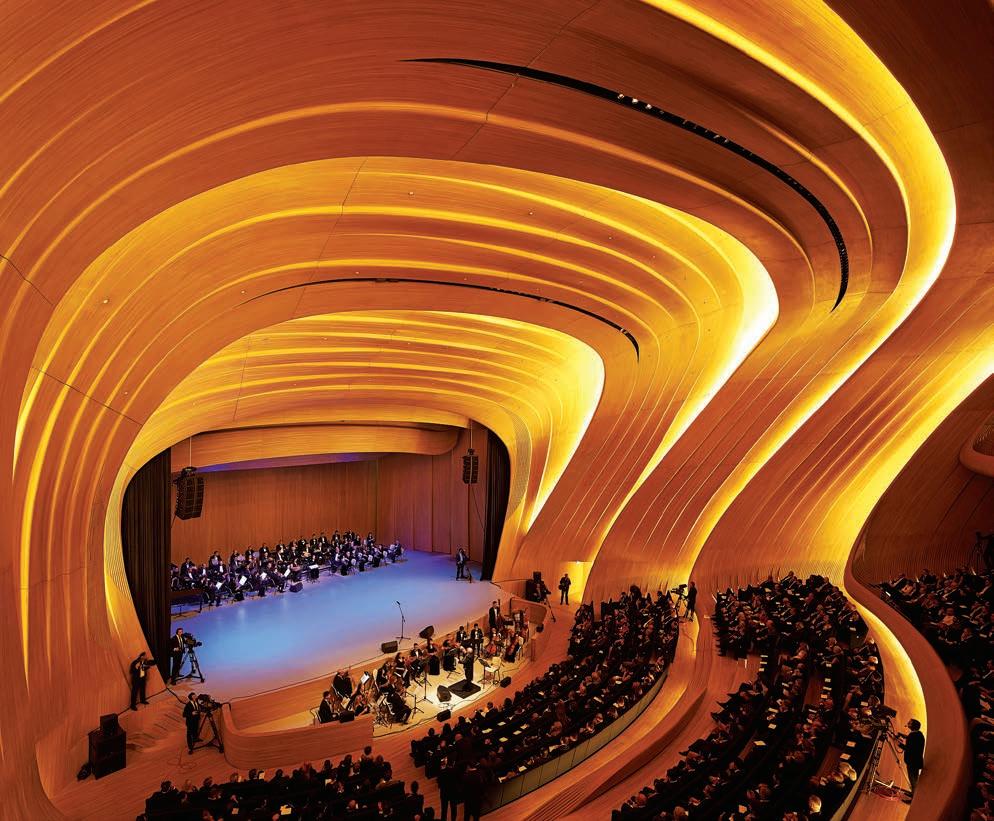
Since its opening in 2012, the Heydar Aliyev Center in Baku, Azerbaijan—a country that belonged to the former Soviet Union— has gained the spotlight for its architectural design. The building of organic forms was designed by Zaha Hadid, an architect known for her innovative forms and unprecedented architectural program. The name of the institution is a tribute to Heydar Aliyev, President of Azerbaijan between 1993 and 2003. Like the Guggenheim Museum in Barcelona—designed by Frank O. Gehry—the Heydar Aliyev Center transformed the city of Baku, on the west coast of the Caspian Sea, as an example of modernization that goes beyond the city, becoming a symbol of Azerbaijan’s development.
But it is through music and shows that the Heydar Aliyev Center has consolidated itself as a cultural center. Its theater has capacity for 1,000 people and its acoustics were planned in the smallest details, using insulating materials that are both functional and aesthetic. Its architecture made use of the best geometric shape of the floor plan, which allows music to perfectly propagate to all corners of the auditorium and making the sound bounce off and become isolated on the thick wall at the back of the auditorium.
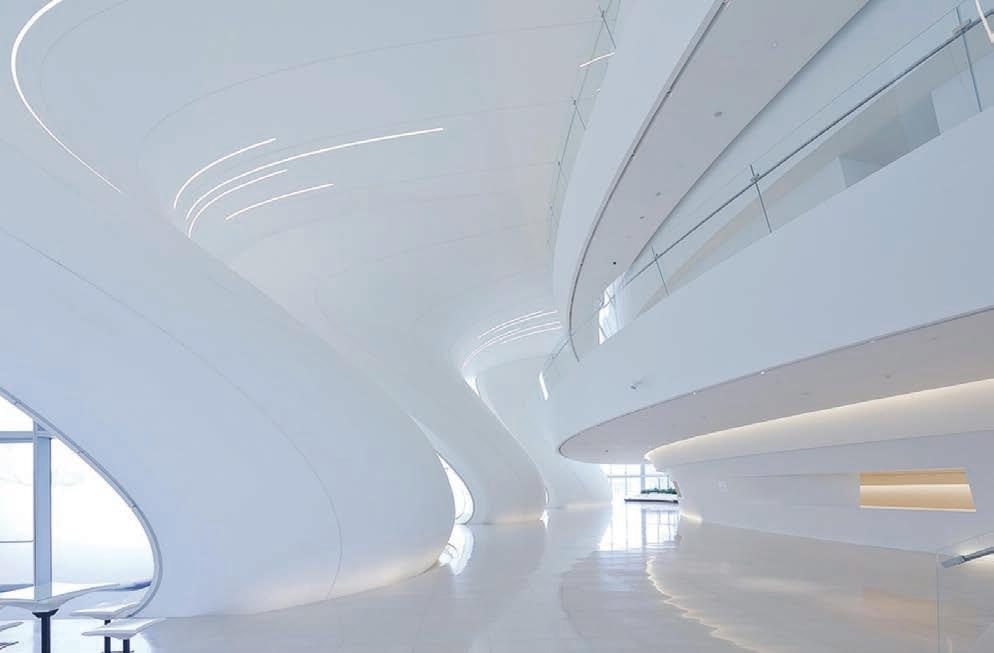
The Vienna Symphony Orchestra, soloists from La Scala in Milan, Serbian filmmaker and musician Emir Kusturica, great personalities of the country’s culture and, more recently, American jazz singer Dianne Reeves, have already performed there. For those who did not have the privilege of visiting its majestic interior, it is worth seeing the short film of the campaign for the Scent perfume, by Hugo Boss, shot in 2015, directed by Drake Doremus and starring actor Jamie Dornan and model Birgit Kos. This film shows in details the glamour of the cultural center with the soundtrack by Jonathan Fitas.

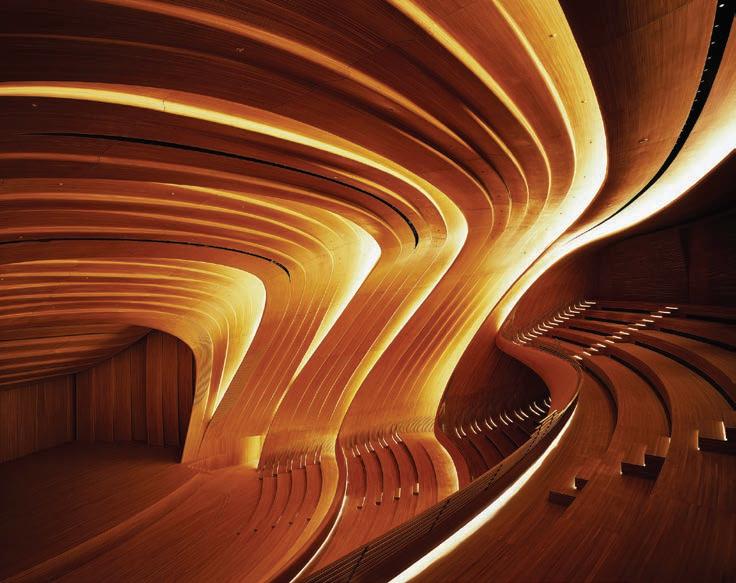
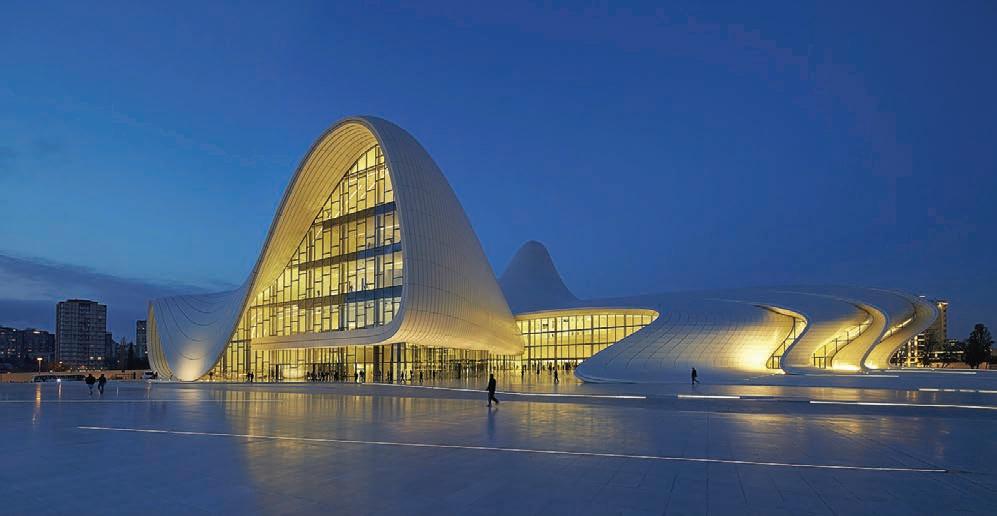
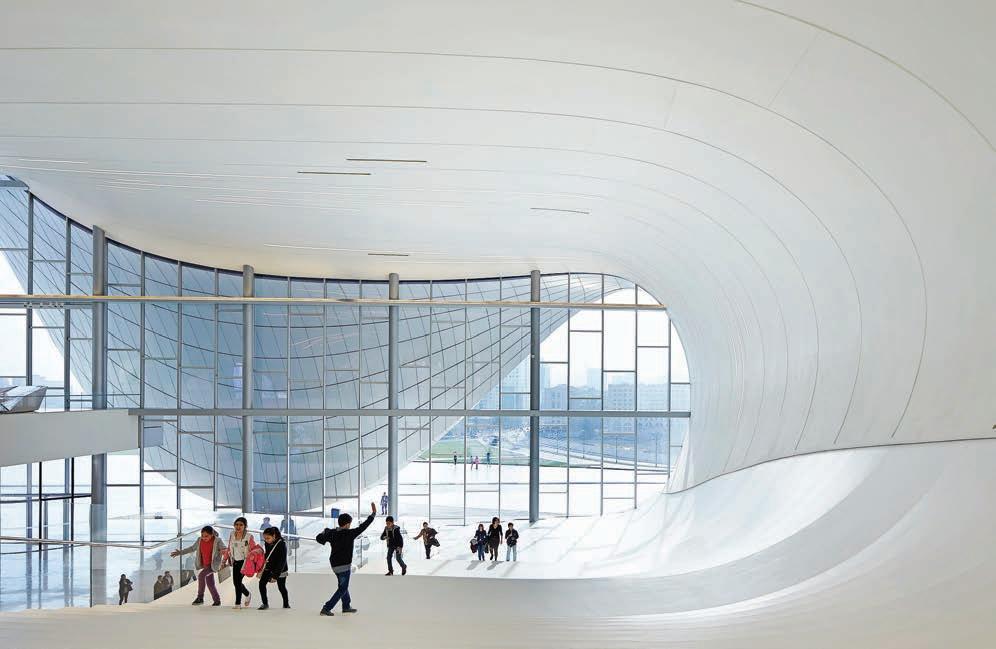
 BY: LUIZ CLAUDIO RODRIGUES
BY: LUIZ CLAUDIO RODRIGUES
“Even when there’s nothing special to see, New York is great!”
Phrase by journalist Joyce Pascowitch—director of the well-known magazine that bears her name, and of the lifestyle website Glamurama—who has traveled the world and has had an apartment in the city for many years. Her words summarize this WHAT’s NEXT report on the city. From the beginning, the idea behind the article was to reveal what insiders—in particular, the Brazilians who live there—like most about the city. Unanimously, using different words, they all said the following: New York teaches you a whole new way to see the world. It is a city that expands your horizons. When in town, Joyce likes to see the exhibitions in the galleries in Chelsea and always looks for speakeasy events or performances.
In turn, architect Raquel Silveira—creator of the memorable editions of Mostra Black, of interior design in the early 2010s, in São Paulo—who has lived in NY since 1993 in a townhouse in Manhattan, says the city is a microcosm of all the metropolises in the world.




“Every day and every hour we learn something new in terms of culture and behavior, that otherwise wouldn’t be possible even after several trips around the world,” says Brazilian architect who also points out that the Big Apple keeps reinventing itself. “It’s a complex city, full of information, a city where you think you were late to arrive and will be leaving too soon,” she jokes. For those who like gastronomy, Raquel recommends the Lebanese restaurant Ilili, on Fifth Avenue, “where you can eat the best raw kibbeh in the world”; Kappo Masa, specializing in Asian food and seafood, next to the Gagosian Gallery, on the Upper East Side; and The Spotted Pig, in the West Village, “which serves unforgettable hamburgers.” For those who like decoration, she recommends BDDW, on Crosby Street, with handmade furniture designed by American Tyler Hays.

It’s a complex city, full of information, a city where you think you were late to arrive and will be leaving too soon” (Raquel Silveirra)
the world, where people have the freedom to do what they want,” he says. He likes the legendary bar of the Carlyle hotel, where every week filmmaker Woody Allen plays the clarinet with the Eddy Davis jazz band. He also likes the classic Indochine restaurant “for the decor, for the food and for being a place that has remained unchanged in a city that is always renewing itself.” Another place where he is a regular is Cipriani, a restaurant that has gone through four generations and has become a renowned hospitality brand. He also recommends Sant Ambroeus, on Madison Avenue, “a combination of restaurant and deli, where they sell bread, serve sandwiches, confectionery and ice cream.”






New York is an eclectic city, open to the world, where people have the freedom to do what they want (Jorge Elias)
Burberry, Moncler, Oscar de La Renta, among others. “I’ve always been delighted by the pace of the city. Life is really dynamic and surrounded by intellectually stimulating people,” says Uzerdo. Among his favorite is the Empire Diner, “a classic art deco, next to my house, where scenes from the film Manhattan, by Woody Allen were shot.” The Pitty bar in the West Village is another favorite. “Great for sitting at tables on the sidewalk during warm spring days.” Among the parks, he recommends the New York Botanical Garden. In the arts segment, The Frick Collection, “museum on the Upper East Side that has a beautiful collection of 18th century works.” Finally, New York, from any angle, is incomparable, untranslatable, unique, revolutionary, hyperbolic. A timeless mix of modernity and innovation.

Cyrela’s Yconyc has the identity that combines design, art and culture inspired by New York. The residential building is in a prime location in the city, right next to Ibirapuera Park and several facilities in the south side.





I’ve always been delighted by the pace of the city. Life is really dynamic and surrounded by intellectually stimulating people (Daniel Urzedo)
Always in search of innovation and closely following contemporary living trends, Cyrela idealizes and develops projects with a differentiated touch, combining unique architecture, author design, distinct concepts and innovations that allow people to live in places that amaze in every detail.



The residential located close to the Parque das Bicicletas (Bicycle Park) was conceived as a hotel, with emphasis on its communal areas, similar to an exclusive hotel. Its façade—with transparent glass boxes—faces the Parque das Bicicletas, in order to connect the natural landscape with the apartments and their residents. Its concept brings together classic with disruptive, inspired by the Hôtel Plaza Athénée, in Paris, which also mixes the same elements found in the building.

Cyrela’s newest product line follows the concept of smaller spaces and resonates with the habits of people who are changing the way they live and consume. In this collection, the projects are composed of studios. The first, Cyrela For You Vila Mariana, combines design, functionality, greater comfort, more amenities and less excesses. A concept designed based on the profile of a contemporary world, but without giving up the style that Cyrela adds to its projects. The idea for the lobby is to be a flexible space: at one moment it can be a party room, while at others, a meeting room.



Spaces where dreams come to life, gain form and beauty with exquisite finishes and unexpected sophistication. The quest for perfection, signed by Cyrela
With innovation and exclusivity, the city of São Paulo renews its urban landscape with icons created by Cyrela
A Cyrela inspired by New York City is born. A project that combines design, art and culture from the Big Apple. With two independent condos: The Residences, with exclusiveness and elegance; and High Line, with apartments tailored for this moment of your life.
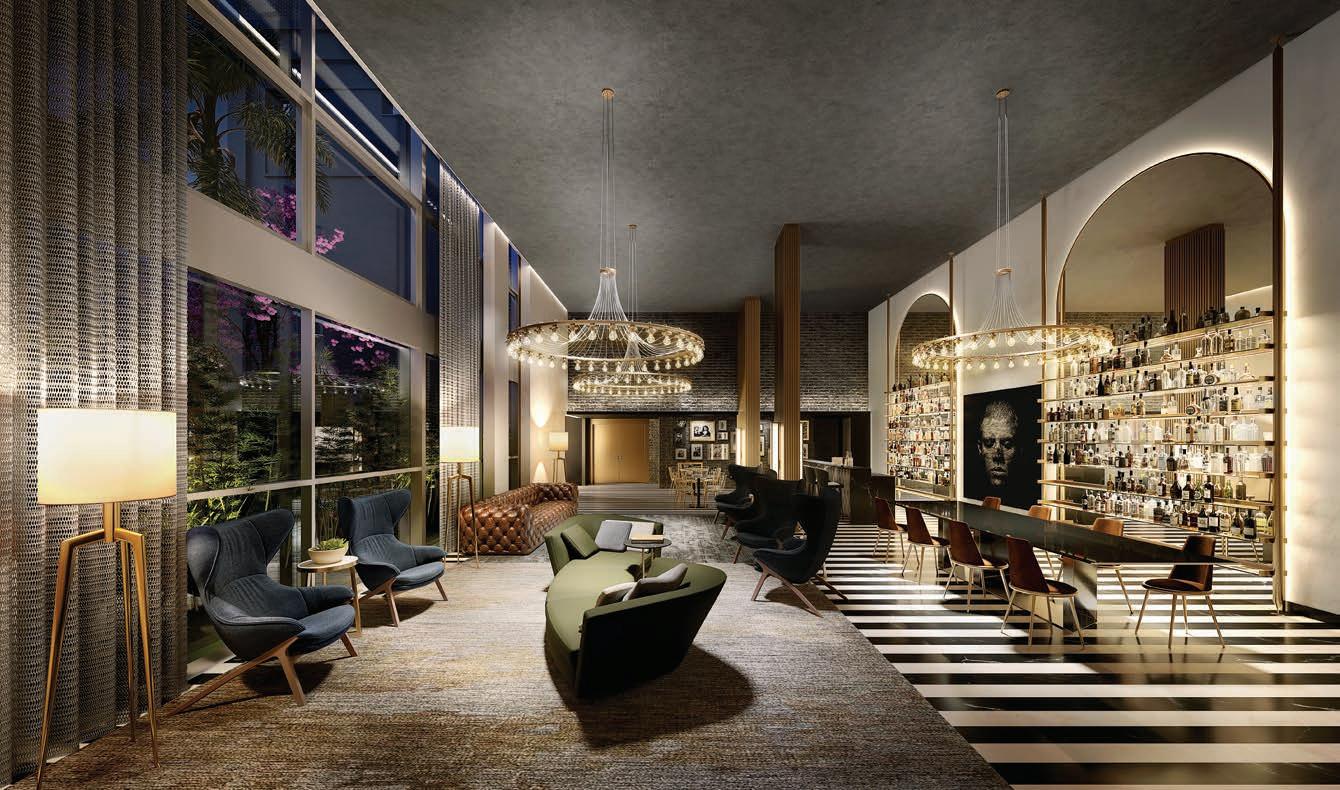
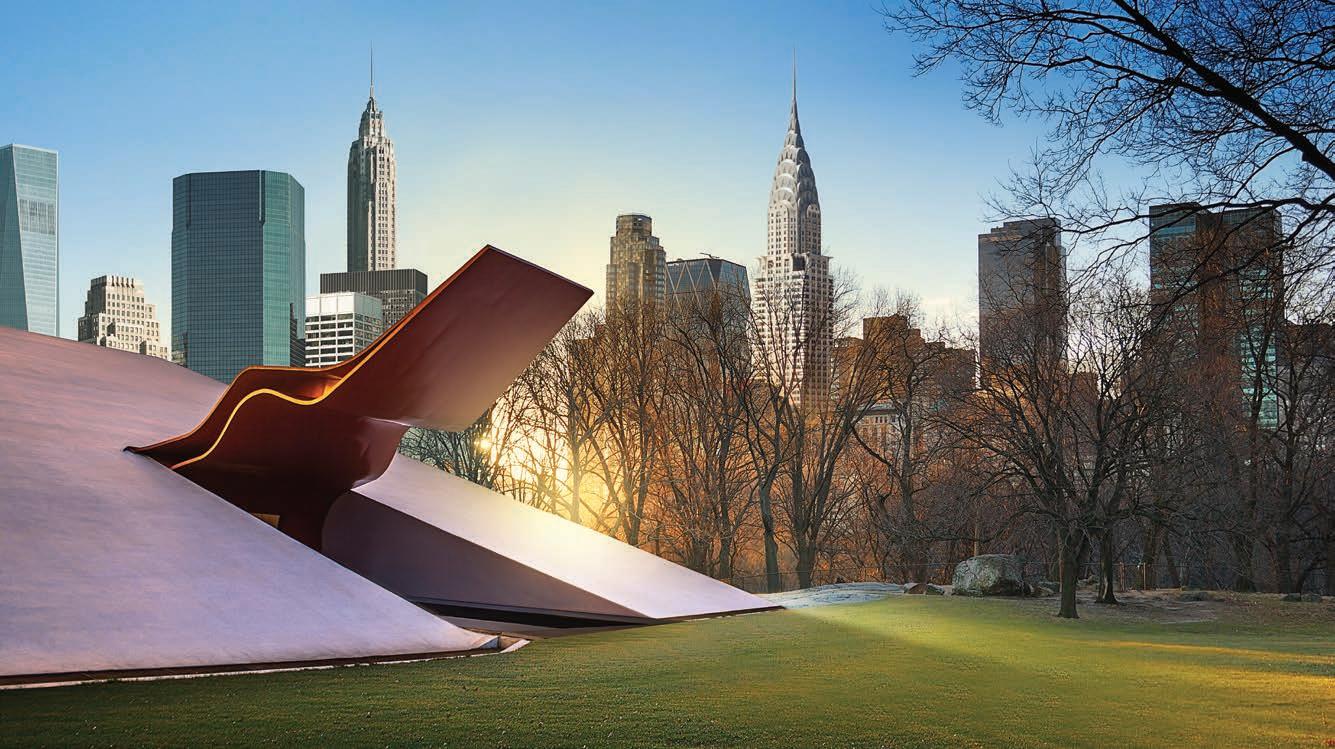

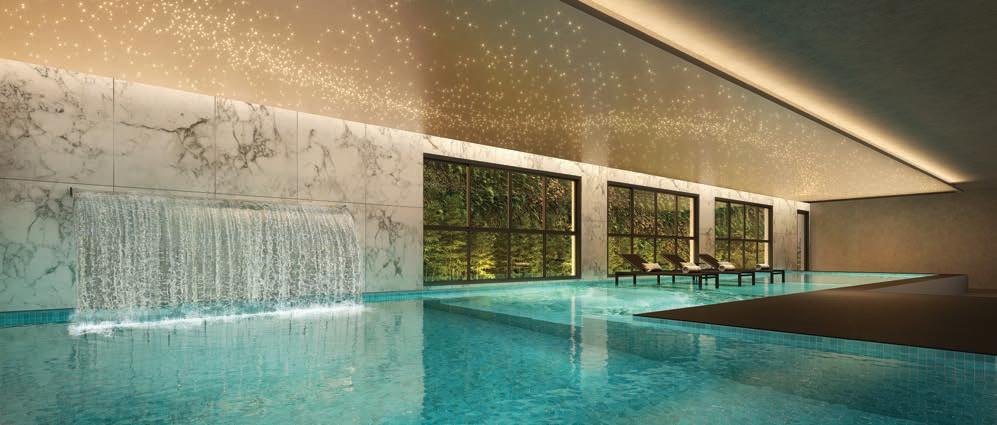
ARTI PERDIZES Inspired by the excellence of Italian design, the Arti Perdizes project was conceived in three concepts: art, as a way of expanding the perception of beauty present in every detail; design, such as refinement, sophistication and elegance; and fashion, which values details, textures and shapes.
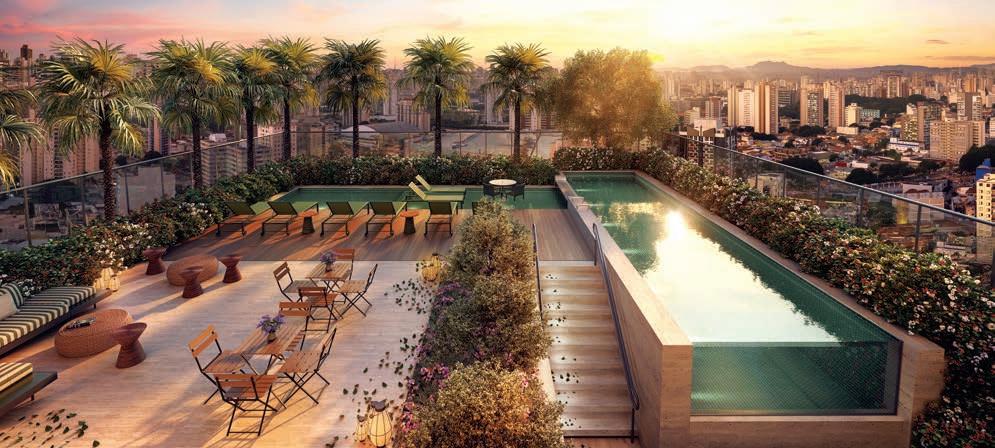

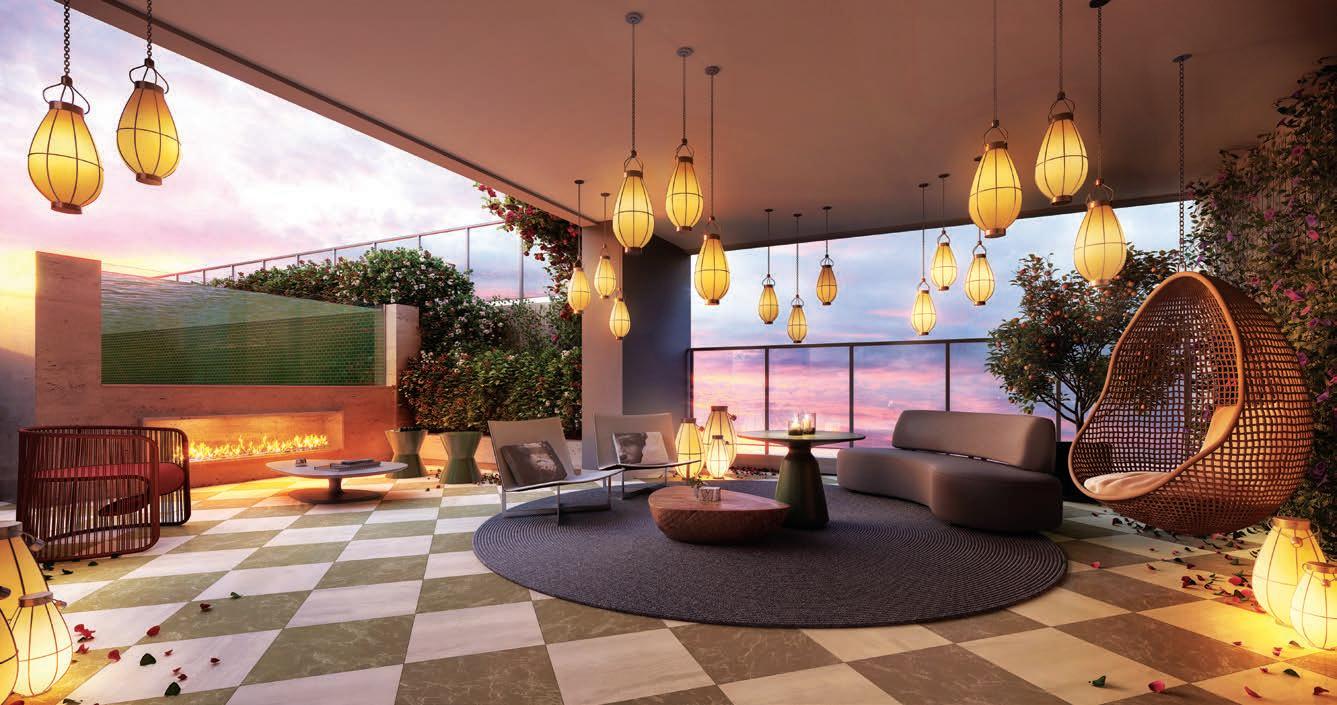
Cyrela’s sophistication joined the international design of Yoo Studio, bringing to Perdizes a project with a transparent soul. With wide open spaces and a façade with transparent glass balconies, surrounded by natural light that reflects and duplicates the spaces, while integrating the interiors with the city landscape.
